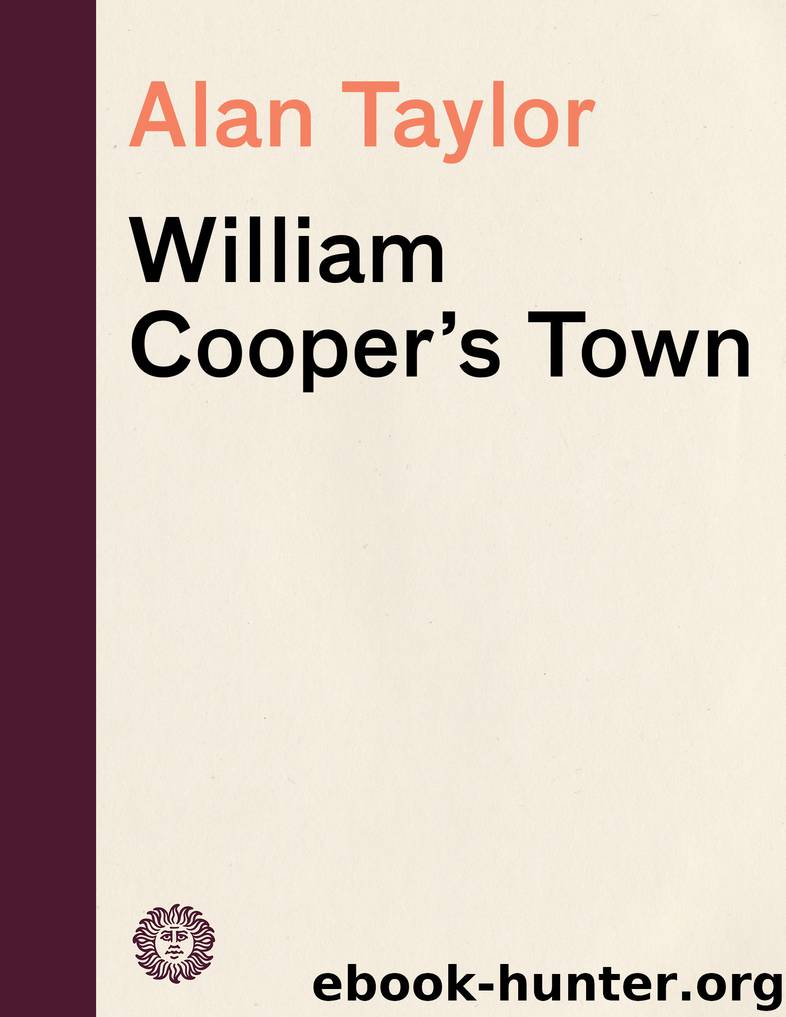William Cooper's Town by Alan Taylor

Author:Alan Taylor
Language: eng
Format: epub
Publisher: Knopf Doubleday Publishing Group
Published: 2018-11-27T16:00:00+00:00
EXPECTATIONS
William Cooper wanted his children to master the elitist political principles that he had adopted during the 1790s. Determined to preserve his sons from democratic notions, in 1802 Judge Cooper took offense at something said or done by Oliver Corey, the village schoolteacher (at that time Samuel Cooper was probably studying with Corey). Recognizing his dependence on Cooper’s patronage, Corey quickly apologized, adding: “[However,] as I have ever been invariably a sincere friend, and wellwisher to you, and your worthy family (admitting that I have done wrong in this instance,) I think I have a just claim to your pardon; if not to a share in your future friendship. As to my political principle, I can assure you, that I ever have been and still continue to be as true a Federalist, as is possible for a poor person to be.” The Cooper papers also include a child’s penmanship exercise with a political moral: “If I had a dog that had not more modesty than a Democrat, I would shoote him. There is not one of them but thinks himself fit for any Office in the United States—a devilish likely set of fellows to be sure aint they? ha! ha!! ha!!! 1801.” The hand is probably that of the youngest son, and future novelist, James, then an eleven-year-old boy. Twenty-two years later James Cooper explained to a friend, “You know my antipathies, as you please to call them, to Mr. Jefferson. I was brought up in that school where his image seldom appeared, unless it was clad in red breeches, and where it was always associated with the idea of infidelity and political heresy.” All five of the judge’s sons became Federalists active in electioneering letters, meetings, and committees. But none ever ran for office, recognizing the lingering unpopularity of their family name in Otsego politics.6
Much of the children’s education in gentility occurred at home, in the Manor House and Otsego Hall. The surviving evidence suggests an affectionate and playful but teasing household that took its cues from their sociable father’s delight in jokes, poetry, and stories. James Fenimore Cooper fondly recalled his “noble looking, warm hearted, witty father, with his deep laugh, sweet voice and fine rich eye, as he used to lighten the way, with his anecdote and fun.” Discussing the strong Yankee accent that he encountered at Yale College, James Fenimore Cooper recalled an incident characteristic of life in Otsego Hall:
When I was a boy, I was sent from a middle state, for my education, to Connecticut. I took with me, of course, the language of my father’s house. In the first year I was laughed out of a great many correct sounds, and into a great many vulgar and disagreeable substitutes. At my return home to pass a vacation, I almost threw a sister into fits by calling one of her female friends a “virtoous angel,” pronouncing the first syllable of the last word like the article. It was in vain that I supported my new reading by the authorities of the university.
Download
This site does not store any files on its server. We only index and link to content provided by other sites. Please contact the content providers to delete copyright contents if any and email us, we'll remove relevant links or contents immediately.
Fanny Burney by Claire Harman(25796)
Empire of the Sikhs by Patwant Singh(22190)
Out of India by Michael Foss(16317)
Leonardo da Vinci by Walter Isaacson(11928)
Small Great Things by Jodi Picoult(6113)
The Six Wives Of Henry VIII (WOMEN IN HISTORY) by Fraser Antonia(4802)
The Wind in My Hair by Masih Alinejad(4431)
The Lonely City by Olivia Laing(4134)
The Crown by Robert Lacey(4122)
A Higher Loyalty: Truth, Lies, and Leadership by James Comey(4045)
The Iron Duke by The Iron Duke(3657)
Millionaire: The Philanderer, Gambler, and Duelist Who Invented Modern Finance by Janet Gleeson(3578)
Sticky Fingers by Joe Hagan(3462)
Alive: The Story of the Andes Survivors by Piers Paul Read(3326)
Papillon (English) by Henri Charrière(3283)
Joan of Arc by Mary Gordon(3272)
Stalin by Stephen Kotkin(3097)
Aleister Crowley: The Biography by Tobias Churton(3033)
Ants Among Elephants by Sujatha Gidla(2933)
